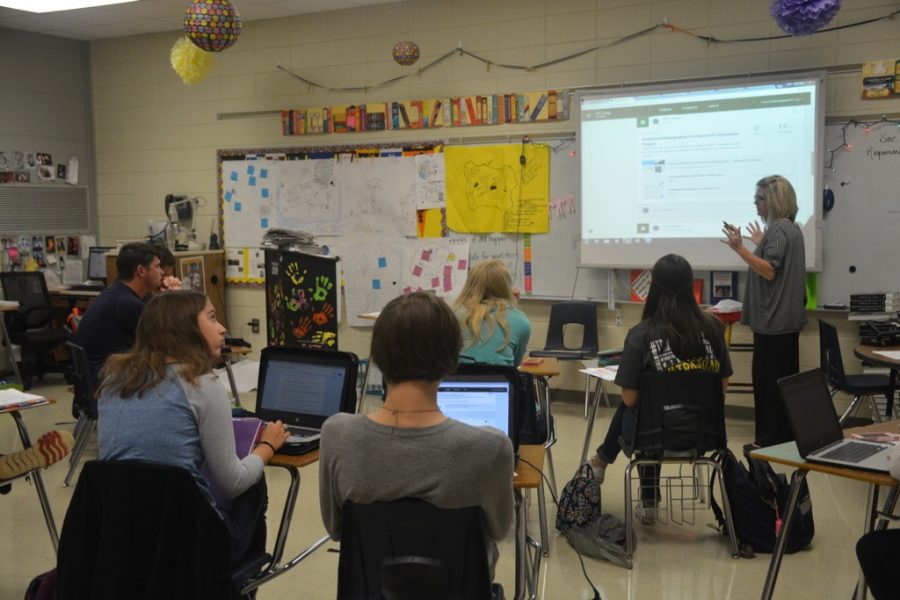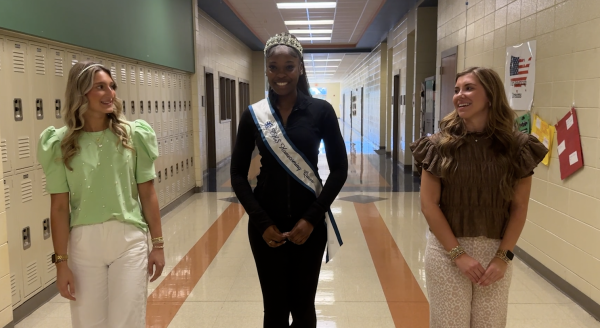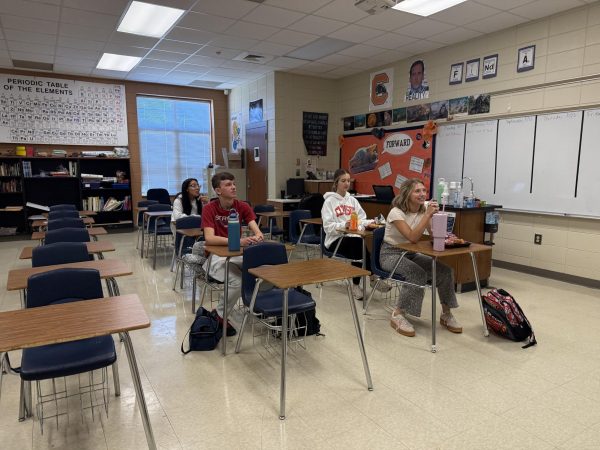Advanced Placement courses provide students with college-like experiences
AP Language teacher Holly Hollifield leads her first-block class in a discussion. Hollifield designs her classes to mirror college-level English classes.
The “hard” classes, as some would say.
The classes that some look forward to and others dread.
AP classes.
These courses are structured to be challenging and to help prepare high school students for college.
“(The goal behind AP classes) is to give those students planning on attending a four-year institution an advantage going into college,” Principal Ty Dawkins said. “If they make a three, four or five on the exam, depending on the college and score, they’ll receive a college credit. There is also a financial benefit because students will go into college with credits.”
Dawkins believes that students should prepare themselves for rigorous coursework if they plan to take AP courses in the future.
“Prepare for the rigor in AP courses because they are set up and designed like a college course,” Dawkins said.
English teacher Holly Hollifield agrees with Dawkins but also believes that reading is a great way to prepare as well.
“I feel like the pace, workload and level of rigor is more preparing for students going to college,” Hollifield said. “It teaches them how to manage time, multitask and work independently. Read anything and everything even if it isn’t for school. Also, begin writing and learning new vocabulary.”
Senior T.J. Hollon has taken AP courses in the past and is taking three this year. He feels as if grasping some understanding of what the exam at the end of the course will entail was a great way to prepare himself.
“To prepare for an AP course, I try to understand what the AP exam will be like, because in order to get the college credit, you have to pass the exam,” Hollon said.
Hollon also feels that getting organized and personally preparing yourself in every way you know how is important.
“Make sure you are organized and be prepared to test yourself,” Hollon said. “AP classes are more intense than any other class you have taken, but as long as you work at it and continue to understand what you are learning, you can have a great outcome.”
Hollifield believes that a big help would be to talk to others who have taken the same class you want to take.
“(If you plan to take AP classes,) definitely do the summer reading, talk to people who have been in the course before, people who passed the exam and people who didn’t, and try to sit in on a class if possible,” Hollifield said.
As a teacher, Hollifield feels as if the pace is the main difference between teaching an AP course in comparison to a CP class.
“(As an AP teacher), I can move at a faster pace, and I know that students can handle the load in class,” Hollifield said. “I can also time my students. In a CP class, I always try to link things more to the real-world, whereas in AP, I’m talking more about English in college.”
For students, she believes that the intensity and format of the exam are the biggest differences.
“The focus on skills and the format of the AP exams (is the biggest difference in AP classes for students),” Hollifield said. “Also, the amount of outside reading and projects is more intense.”
Hollon feels as if the biggest difference is learning on a deeper level.
“While taking an AP course, you are forced to dive deeper into what you are learning and you learn more than you’d ever expect,” Hollon said. “You also have to study for the AP exam which is a lot harder than a regular exam, so studying is more vigorous.”
Hollon said that AP courses have taught him how to manage his time and study more efficiently.
“Taking AP courses has helped me greatly by improving my study habits, Hollon said. “Instead of being lazy and not knowing what to do, I’m forced to push myself and work which includes working, studying, and juggling my schedule differently.”
Dawkins believes that AP classes teach students and also give them the foundation of support they need so they know how to handle college classes alone when they get to college.
“It’s better to make a B or C in a high school where I can be there for you and help you get through it than make a C in college and not know how to handle it,” Dawkins said. “Anything worthwhile won’t be easy.”
Your donation will support the student journalists of Chapman High School. Your contribution will allow us to purchase equipment and cover our annual website hosting costs.






